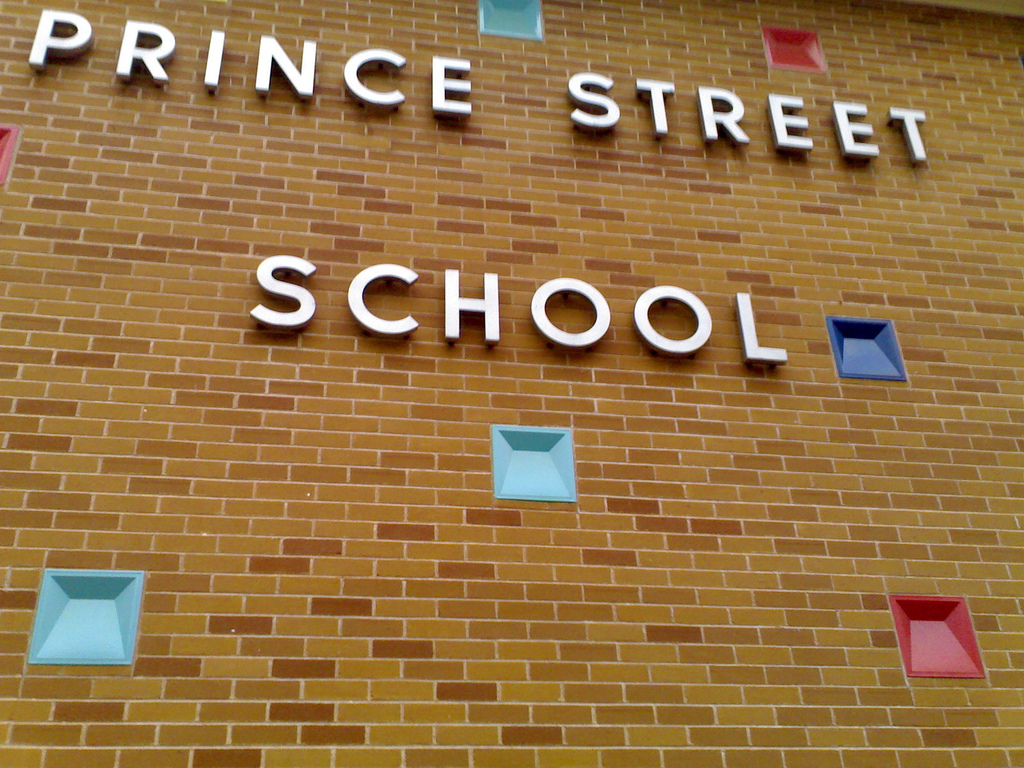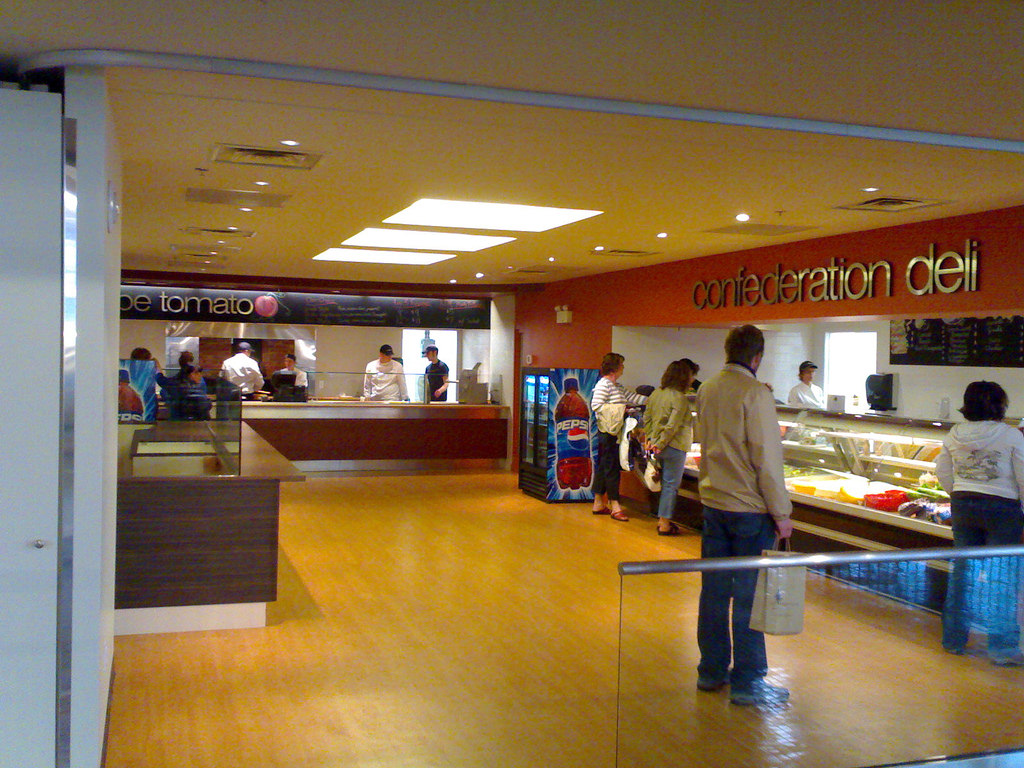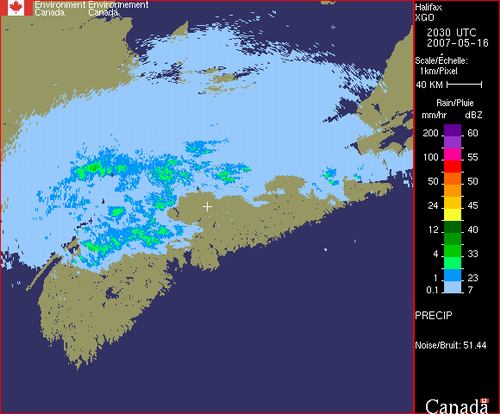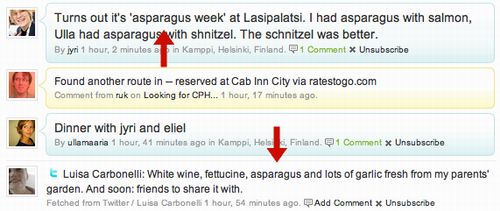It’s opening day at Café Diem on Victoria Row in [[Charlottetown]]. This will be my first opportunity to experience the place as a bona fide coffee drinker. Not warm or sunny enough to sit outside, of course, but exciting nonetheless.
Update: Showed up for coffee this morning; sign on door said that opening is delayed, due to weather, until May 21st.
Well, okay, this isn’t really “day two” at all — it’s more like day 12 for us in terms of our work with Elections PEI on the Provincial General Election. But this is the first time I’ve had since “day one” last week to come up for air and report on what we’ve been up to.
Back last Monday when I last reported in, we were about to launch our big data entry effort. The next night we gathered in our bunker in the basement of the Shaw Building in Charlottetown and managed the process of having over 90,000 electors updated in the registry of electors by a team of 112 data entry staff.
The night went very well — there were none of the browser-compatibility and network access problems we’d encountered back in 2003 — and because the confirmation process, for the first time in a provincial election, involved working from “pre-filled in” confirmation forms — using information gathered in 2003 and in subsequent municipal elections and provincial by-elections — the whole province wasn’t being “entered in from scratch” so things, relatively speaking, flew by. By 10:00 p.m. on Tuesday night the majority of the data entry task was completed and with a little clean-up on Wednesday we were ready to print the Preliminary List of Electors on Thursday morning.
Once the Preliminary List was out the door, work began on processing any new information that came in from Returning Officers about changes, additions or deletions to the list. The deadline for changes was this Tuesday night, and with that information updated in the database we were ready to generate the Official List of Electors this morning. I burned the CD to go to the Queen’s Printer this morning just before lunch, and their giant super-capable steam-powered Xerox machines are busy churning out the lists as I write.
They’ll be put to use for the first time on Saturday when Advance Polls open for the first time.
With that CD out the door, our job is done for now. At least in terms of hard-edge data management. Our focus now turns towards polling day — May 28th — and the system we built first for the 1996 election (but that’s evolved heavily since then) that delivers unofficial election results. More on that later.
Tonight was “Parent Orientation Night” at Prince Street School for the parents of kids, like [[Oliver]], who will be starting Grade One in the fall.

I have had two excellent sources of wise counsel in preparation for all of this.
My friend Ann offered the advice that, in essence, I shouldn’t try to play out my own educational issues at the expense of Oliver or his teachers. In other words the “homework’s for bores — go make a volcano” parenting that I might wish for will only lead to Bad Things for all concerned. So I’ve decided to channel the old “all formal education is evil” Pete into new-style “do everything you can to help, but don’t be a jerk” Pete.
And my friend Tom, who has a large brood of Prince Street alumni in his family, has been saying only good things about what a good neighbourhood school Prince Street is. Tom’s opinion of things goes a long way in my books, so I’m walking in with a Good Attitude to begin with (Tom also runs the dairy that fuels my morning cappuccino, so he obviously has vast influence on my life…).
So tonight’s mission for me was to sit there, take it all in, and resist the urge to stick my hand up and ask something like “so what’s your condom policy” or “do you include anarchist thinkers in your Grade One political theory classes.” So I whispered quietly to myself “Don’t be a jerk. Don’t be a jerk.”
The school itself, as you can see from the photo above, is very evocative of early-1960s Canadian institutional architecture, right down to the multi-coloured bricks cemented into its front. Inside it’s actually quite interesting: while the old Prince Street Elementary was an imposing behemoth of a building built two centuries ago, the “new” Prince Street is built sort of like a split-level house. I’ve been driving by the school for 15 years, for example, and I had no idea there was a gym tucked inside there somehow.
Grade One orientation was quick and to the point: get your kids to bed early, we’ll be watching for lice, we’re pretty sure they’ll know how to read when they come out the other end. The Principal, the Public Health Nurse, the School Counselor and one of the Grade One teachers all made a short presentation; they were all very pleasant and seemed very unlike the evil manipulators that I’d been casting for their roles in my head in the 36 years since I was in Oliver’s place, and the 6 years that I’ve been anticipating this next jump. Don’t be a jerk. Don’t be a jerk.
Enrollment is down at Prince Street — where there were once 400 kids, there are just over 200 now. For Oliver this means that it’s an open question right now whether there will be two grade one classes or one; they’re losing a staff position for next year, and there are 30 kids registered for grade one right now, so a lot will depend on what rearranging happens between now and then. We were assured that we won’t end up with one class of 30 kids, however.
Next exciting step on this adventure (Don’t be a jerk.) comes next month when the current Grade Oners stay home for the day and the new crop comes in for a beta test. We’ve been instructed not to cry when dropping our kids off for that event: apparently seeing parents cry suggests to kids that school might not be all sweetness and light. Pluck up. Don’t be a jerk.
There was a short outage here tonight — about 30 minutes — that I’ve traced back, oddly enough, to what seems to be a failed port on a Linksys switch. Problem solved, at least for now, by moving a cable over to another port on the same switch.

I don’t know the real story of how Chef Gordon Bailey went from being superstar Dayboat chef to running the new food court at the Confederation Court mall, but I’ve a sense that we’ll all be happy he did, no matter how it happened.
Today is opening day at Urban Eatery, the recasting of the food court — formerly home to traditional mall vendors like Grandma’s Deli and the Oriental Wok — as an upscale, well, urban eatery. It’s still a food court — you can’t completely seal off the Muzak — but boy is this not your father’s food court:

I stopped by on Saturday for their “soft opening” and had a slice of thin-crust brick-oven pizza (“Greek” style — excellent) and a cappuccino (a little milky, no takeaway sugar available, made by, alas, an espresso amateur, but nonetheless not a bad cup of coffee at all). Then [[Oliver]] and [[Catherine]] came by and we shared an apple danish (very good).
The real star of the show, however, is the “confederation deli” section, pictured above. From the looks of things this is a bona fide deli: meat, cheese, fresh veg, and bread that appears to be made in house. I’ll take lunch there soon and let you know how I make out. They also sell bread “to go,” by the way, and we took home an approximation of a baguette on Saturday and consumed most of it on the weekend. It wasn’t “oh my God, I’m in France,” but it was pretty good bread nonetheless, and surely it can only get better.
BGHJ certainly did a fantastic job on the interiors of the space: take out the Pepsi coolers that are anachronistically hulking in the midst of everything and you could be in Kastrup Airport in Copenhagen — it’s all wood floors and polished metal and lower case sans-serif. If nothing else the architectural exorcism of the food court aesthetic on the inside means the place deserves our support.
I’ve long been a fan of the Confederation Court Mall. Having seen the downtowns of several cities in Ontario completely ravaged by downtown “redevelopment” (Brantford, Hamilton, and Peterborough are only three examples) with large-scale razing of existing buildings, the fact that in Charlottetown the same impulse was carried out by preserving what existing and building in was a fortunate masterstroke.
Now that you can get what promises to be a decent sandwich, and the whole place is lit with free wifi, it’s possible that the second floor of the mall, a space that’s tried so hard over the years but has never really taken off, will become an interesting place to hang out. Stay tuned.
My tickets are booked for reboot 9.0 in Copenhagen at the end of May.
I’d been debating whether or not I could get to reboot this year — my third time. I actually registered for the conference, on spec, back in mid-March, and then waited and waited until Premier Binns called an election. He finally did, for May 28th.
Which means that I’ll be up late on the night of the 28th stoking the furnace that drives the election results, then getting up at 4:30 a.m. for an early flight to Montreal, spending the day in Montreal, and then catching an overnight Swiss flight to Copenhagen by way of Denmark.
Although it’s somewhat inconvenient on the front end, I simply couldn’t bear the thought of taking Air Canada cross the Atlantic again, nor the thought of wading through that security line at Heathrow. I’m flying on points to Montreal, paying my way on Swiss; total cost, all-in, was $1,100, which isn’t a steal of a deal, but is still pretty good for late May.
On the way back I’m flying out from Berlin — I’ll get from Copenhagen to Berlin by a method to be determined later — where I hope, among other things, to visit the home Plaze.


 I am
I am